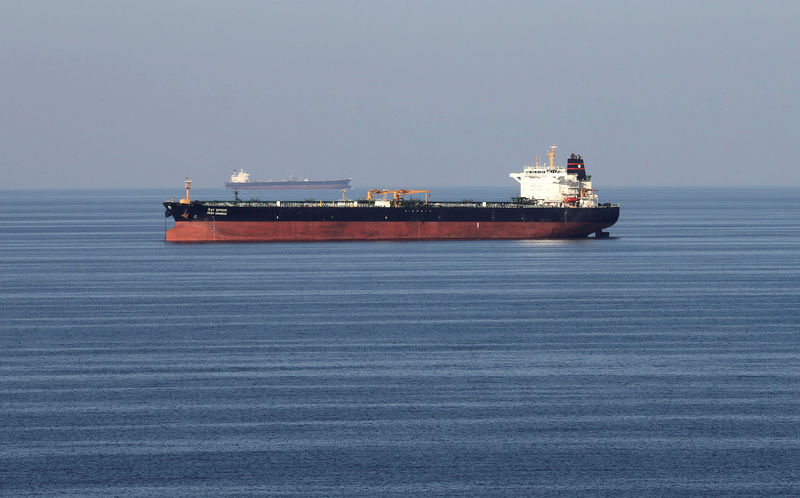By John Irish and Bate Felix
PARIS (Reuters) - Over the past year, France has led a European push to keep trade with Iran alive after the United States tore up the nuclear deal with Tehran and re-imposed sanctions. But over the same period, data shows France has cut purchases of Iranian oil and sharply increased imports from Iran's arch-enemy Saudi Arabia.
In recent weeks, France has used its energy needs to justify a surge in arms sales to the kingdom, even if there is no evidence the 50 percent increase in Saudi purchases of French arms last year was conditional on France buying Saudi oil.
The surge in France's buying of Saudi oil shows Paris is doing less business with Iran even as it publicly encourages European partners to find a way to keep trade with Tehran flowing via the Franco-German-British Instex trade system.
It also underscores how difficult it is for a global power and permanent U.N. Security Council member like France to stand up against the United States and its closest Arab-world ally when they are determined to put the squeeze on Iran.
Last month, Defence Minister Florence Parly said trade ties with allies like Saudi Arabia were essential to safeguarding France's security and energy interests.
"(Weapons) exports make it possible to forge close ties with states that are strategic for the security of France," she told parliament, one of the first times a senior official has linked arms sales to France's broader economic relations with Saudi Arabia. "It puts us at the heart of the Middle East, a key region for our security interests and our energy supplies."
Asked about the link between oil purchases and arms sales, a French diplomatic source was straightforward: "We want to save the nuclear deal because it helps peace in the region, but we have always had a historical relationship with Saudi Arabia so why would we jeopardize this?"
The sharp drop-off in Iran's ability to sell its oil internationally has hit the economy hard, delivering exactly the impact the Instex system is designed to prevent in the long-term.
French finance ministry data shows France bought 2.2 billion euros ($2.49 billion) of Iranian light crude between April 2017 and March 2018, making it France's third largest supplier.
But over the following 12-months, that figure fell 57% to 936 million euros, with imports from Iran stopping altogether from September 2018 onwards, as sanctions bit.
In contrast, French purchases of Saudi oil jumped 50% to 3.7 billion euros between March 2018 and April 2019.
Industry sources say Saudi and Iranian crude oil have very similar properties that make them good substitutes. Over the same period, Paris also substantially increased its purchases of Russian and Iraqi crude, which are also similar.
All countries had to reduce oil imports from Iran as sanctions mounted, although China and India continued to buy after initial U.S. waivers, although they have now also cut purchases.
CLOSER SAUDI TIES
France has nurtured close ties with Saudi Arabia. But the nuclear deal in 2015 between Iran and six world powers - the United States, France, Britain, China, Germany and Russia - eased sanctions in return for Tehran curbing its nuclear program, providing an economic lifeline for Riyadh's rival.
France, with business ties in Iran, moved quickly to capitalize, and some of its biggest corporations followed. Total was the first international oil company to return to Iran, while other French firms such as carmakers PSA and Renault (PA:RENA) also moved back.
Between 2016 and early 2018, French purchases of Iranian crude oil soared to more than 2 billion euros a year.
However, U.S. President Donald Trump, who arrived in the White House as Iran's economy was reaping the benefits of the deal, called it "the worst ever negotiated". He pulled the United States out, re-imposed tough sanctions, including on Iran's oil sector, and threatened punishment for allies like France who kept doing business with Tehran.
The U.S. decision was always likely to tighten French ties with Saudi Arabia, said Jalel Harchaoui, fellow at Clingendael Institute in The Hague.
"The U.S. unilaterally walking away from the JCPOA (nuclear deal) forced France to reduce its economic transactions with Iran. That development is seen as yet another reason to tighten the closeness between Paris and the Gulf capitals," he said.
Saudi Arabia backs the United States' tough line on Iran and has sought to broaden the anti-Iran front. France shares concerns over Iran's ballistic missile program and meddling in the Middle East, but says engagement is preferable to isolation.
FROM WEAPONS TO ENERGY SECURITY
The shift to buying more Saudi oil comes at a sensitive time for France and its relations with the kingdom.
In particular, President Emmanuel Macron is under fire from political rivals and human rights organizations over French weapons sales to Saudi and the United Arab Emirates. Both states have used the weapons in the war in Yemen, where a Saudi-led coalition is fighting Iranian-backed Houthi rebels.
Foreign Minister Jean-Yves Le Drian has urged Riyadh to end the "dirty war" in Yemen, but also accused Iran of supplying the Houthis with weapons they have used against Saudi territory.
He and Macron have defended arms sales to Saudi and the UAE as necessary in the global fight against terrorism.
Saudi Arabia has been France's top arms buyer over the last five years, with sales jumping 50 percent to about 1 billion euros in 2018.
Rather than avoiding the issue, Macron's government has sought to draw a link between energy and security in answering criticism over the weapons sales.

"Maintaining economic relations with these countries means keeping a presence in key regions for our security interests and our energy supplies," Parly said.